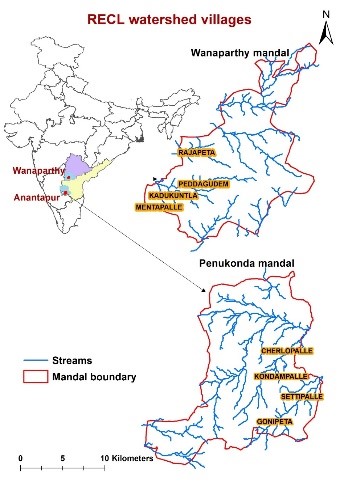
Mr S Niranjan Reddy, Minister of Agriculture, Co-operation and Marketing, Government of Telangana (wielding the microphone in the picture), distributes sheep to women farmers in Wanaparthy watershed. (Inset) Inauguration of a machinery renting center. Photos: BISLD NGO Partner & ICRISAT

In the last two months, the minister visited the project thrice, the recent visit being from December 9 to 10. During his visits, the minister inaugurated farm machinery renting centers and distributed sheep to 73 women beneficiaries in two villages – Mentapally and Peddagudem.
The watershed sites (see map) in Wanaparthy district in Telangana State and Anantapur district in Andhra Pradesh State funded by the Rural Electrification Corporation Limited (REC Limited) and implemented by ICRISAT and partners have emerged as learning sites for doubling farmers’ incomes through minimum investment for maximizing benefits to smallholder farmers, says ICRISAT scientist and project lead, Dr Girish Chander.
Women Empowerment
 Sheep distribution in Wanaparthy in December. Photo: BISLD NGO Partner & ICRISAT |
 Sheep distribution in Anantapur in December. Photo: BISLD NGO Partner & ICRISAT |
As many as 600 women in Wanaparthy and 450 in Anantapur asked for support to start livestock-based livelihoods. About 550 sheep units were distributed so far and 500 more units will be distributed by the end of this year. Sewing machines were provided to 110 women and another 440 will be added to this number by yearend. In 2022, 800 women will receive support for livestock-based livelihoods and 450 women for non-farm-based livelihoods.
Farm Mechanization

Farm machinery renting center in Settipalli village, Anantapur; and (R) Farmer R Rishi Reddy using a multi-crop thresher in his groundnut field in Mentapally, Wanaparthy. Photo: BISLD NGO Partner & ICRISAT
To reduce the drudgery of farmers in general, particularly women, and to streamline farming operations for higher productivity, on-farm mechanization is being promoted through machinery renting centers at the village level. Eight centers with sowing, inter-culture, harvesting and threshing machines have been set up in each of the watershed sites (see map).
Water Augmentation

Farm-ponds constructed in Wanaparthy watershed. Photo: BISLD NGO Partner & ICRISAT
Funding agency: Rural Electrification Corporation Limited, Gurugram, India
Partners: NGOs (Samatha Society for Rural Education and Development, Anantapur; BAIF Institute for Sustainable Livelihoods and Development (BISLD), Hyderabad); Watershed Associations; Telangana and Andhra Pradesh State Departments of Agriculture and the International Crops Research Institute for the Semi-Arid Tropics (ICRISAT).
CGIAR Research Program: Water, Land and Ecosystems



